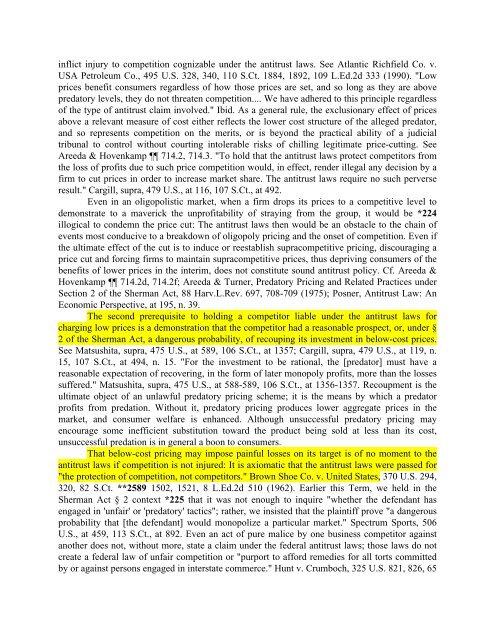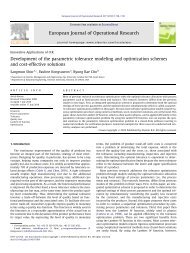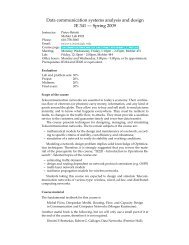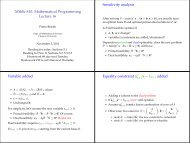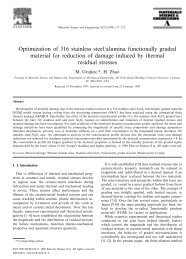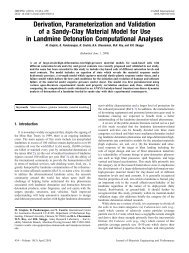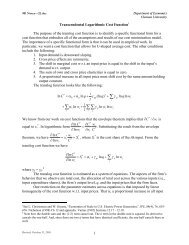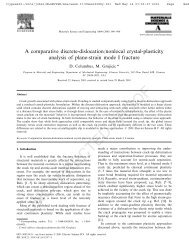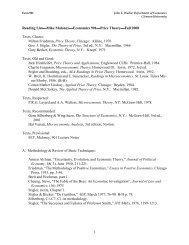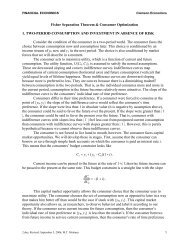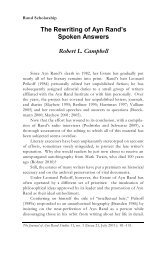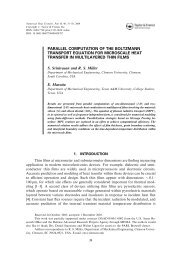509 U.S. 209, 113 S.Ct. 2578 BROOKE GROUP LTD., Petitioner v ...
509 U.S. 209, 113 S.Ct. 2578 BROOKE GROUP LTD., Petitioner v ...
509 U.S. 209, 113 S.Ct. 2578 BROOKE GROUP LTD., Petitioner v ...
Create successful ePaper yourself
Turn your PDF publications into a flip-book with our unique Google optimized e-Paper software.
inflict injury to competition cognizable under the antitrust laws. See Atlantic Richfield Co. v.<br />
USA Petroleum Co., 495 U.S. 328, 340, 110 S.<strong>Ct</strong>. 1884, 1892, 109 L.Ed.2d 333 (1990). "Low<br />
prices benefit consumers regardless of how those prices are set, and so long as they are above<br />
predatory levels, they do not threaten competition.... We have adhered to this principle regardless<br />
of the type of antitrust claim involved." Ibid. As a general rule, the exclusionary effect of prices<br />
above a relevant measure of cost either reflects the lower cost structure of the alleged predator,<br />
and so represents competition on the merits, or is beyond the practical ability of a judicial<br />
tribunal to control without courting intolerable risks of chilling legitimate price-cutting. See<br />
Areeda & Hovenkamp 714.2, 714.3. "To hold that the antitrust laws protect competitors from<br />
the loss of profits due to such price competition would, in effect, render illegal any decision by a<br />
firm to cut prices in order to increase market share. The antitrust laws require no such perverse<br />
result." Cargill, supra, 479 U.S., at 116, 107 S.<strong>Ct</strong>., at 492.<br />
Even in an oligopolistic market, when a firm drops its prices to a competitive level to<br />
demonstrate to a maverick the unprofitability of straying from the group, it would be *224<br />
illogical to condemn the price cut: The antitrust laws then would be an obstacle to the chain of<br />
events most conducive to a breakdown of oligopoly pricing and the onset of competition. Even if<br />
the ultimate effect of the cut is to induce or reestablish supracompetitive pricing, discouraging a<br />
price cut and forcing firms to maintain supracompetitive prices, thus depriving consumers of the<br />
benefits of lower prices in the interim, does not constitute sound antitrust policy. Cf. Areeda &<br />
Hovenkamp 714.2d, 714.2f; Areeda & Turner, Predatory Pricing and Related Practices under<br />
Section 2 of the Sherman Act, 88 Harv.L.Rev. 697, 708-709 (1975); Posner, Antitrust Law: An<br />
Economic Perspective, at 195, n. 39.<br />
The second prerequisite to holding a competitor liable under the antitrust laws for<br />
charging low prices is a demonstration that the competitor had a reasonable prospect, or, under §<br />
2 of the Sherman Act, a dangerous probability, of recouping its investment in below-cost prices.<br />
See Matsushita, supra, 475 U.S., at 589, 106 S.<strong>Ct</strong>., at 1357; Cargill, supra, 479 U.S., at 119, n.<br />
15, 107 S.<strong>Ct</strong>., at 494, n. 15. "For the investment to be rational, the [predator] must have a<br />
reasonable expectation of recovering, in the form of later monopoly profits, more than the losses<br />
suffered." Matsushita, supra, 475 U.S., at 588-589, 106 S.<strong>Ct</strong>., at 1356-1357. Recoupment is the<br />
ultimate object of an unlawful predatory pricing scheme; it is the means by which a predator<br />
profits from predation. Without it, predatory pricing produces lower aggregate prices in the<br />
market, and consumer welfare is enhanced. Although unsuccessful predatory pricing may<br />
encourage some inefficient substitution toward the product being sold at less than its cost,<br />
unsuccessful predation is in general a boon to consumers.<br />
That below-cost pricing may impose painful losses on its target is of no moment to the<br />
antitrust laws if competition is not injured: It is axiomatic that the antitrust laws were passed for<br />
"the protection of competition, not competitors." Brown Shoe Co. v. United States, 370 U.S. 294,<br />
320, 82 S.<strong>Ct</strong>. **2589 1502, 1521, 8 L.Ed.2d 510 (1962). Earlier this Term, we held in the<br />
Sherman Act § 2 context *225 that it was not enough to inquire "whether the defendant has<br />
engaged in 'unfair' or 'predatory' tactics"; rather, we insisted that the plaintiff prove "a dangerous<br />
probability that [the defendant] would monopolize a particular market." Spectrum Sports, 506<br />
U.S., at 459, <strong>113</strong> S.<strong>Ct</strong>., at 892. Even an act of pure malice by one business competitor against<br />
another does not, without more, state a claim under the federal antitrust laws; those laws do not<br />
create a federal law of unfair competition or "purport to afford remedies for all torts committed<br />
by or against persons engaged in interstate commerce." Hunt v. Crumboch, 325 U.S. 821, 826, 65


